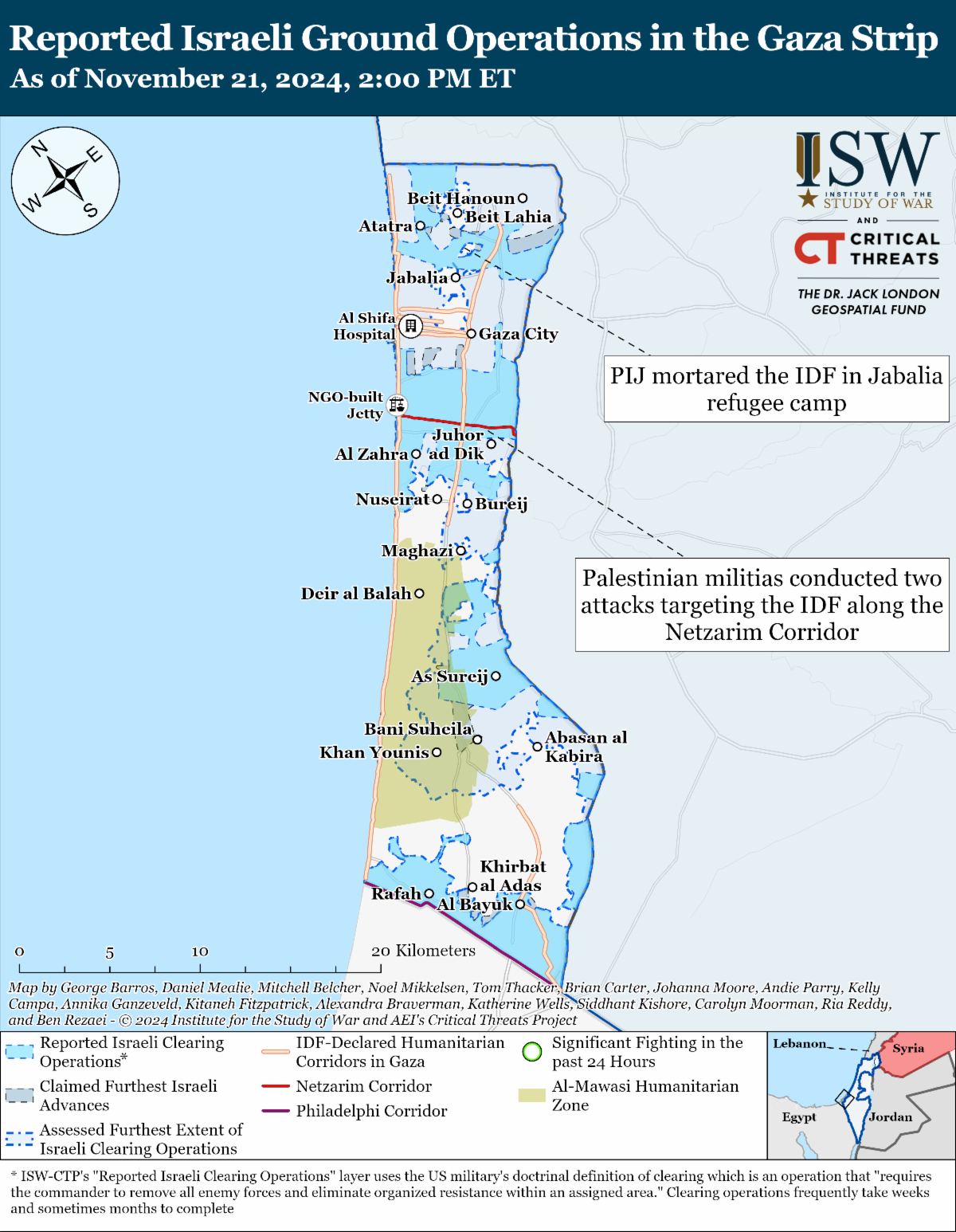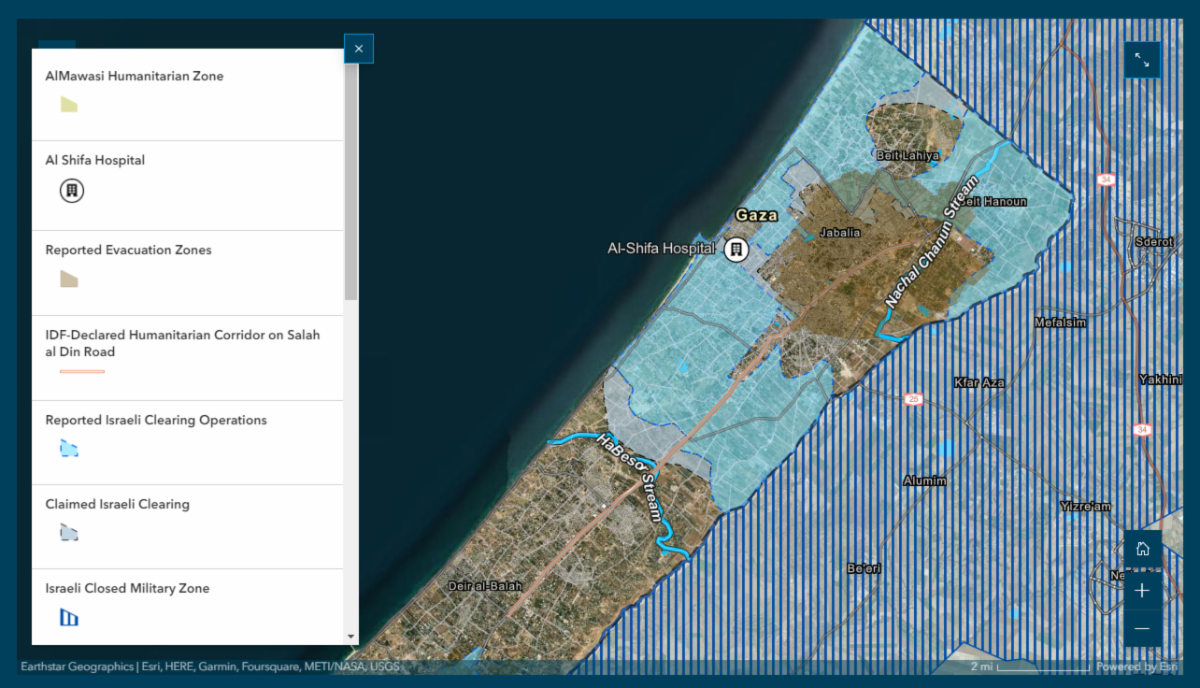The International Atomic Energy Agency (IAEA) Board of Governors passed the E3 (the United Kingdom, France, and Germany) censure resolution against Iran on November 21. The resolution censured Iran for failing to cooperate with the IAEA and comply with the Nuclear Nonproliferation Treaty. The resolution requires that the IAEA to produce a "comprehensive report" on Iranian nuclear activities by spring 2025. CTP-ISW previously assessed that the report would almost certainly confirm Iranian noncompliance with the 2015 Joint Comprehensive Plan of Action (JCPOA) and lay the foundation for the E3 to reimpose UN Security Council sanctions on Iran--known as "snapback" sanctions. The censure resolution comes after the IAEA issued a report on November 19 showing that Iran has increased its stockpile of highly enriched uranium since August 2024. The Atomic Energy Organization of Iran (AEOI) Director Mohammad Eslami responded to the censure resolution by ordering the activation of a ”large collection of new and advanced centrifuges of various types." The AEOI stated that Iran will continue to cooperate with the IAEA, though it remains unclear to what extent. CTP-ISW will provide further assessments and details in the coming days.
The United States and E3 (the United Kingdom, France, and Germany), prior to the IAEA Board of Governors vote on the censure resolution, called on Iran to "immediately dispose" of its highly enriched uranium stockpile on November 21. US Ambassador to the IAEA Laura Holgate said that Iran should stop producing uranium enriched up to 60 percent and "downblend its 60 percent [enriched uranium] stockpile entirely." Downblending is the process of converting highly enriched uranium into low-enriched uranium. The E3 issued a joint statement similarly requesting that Iran “immediately dispose of its high enriched uranium stockpile.” Iran previously offered to cap its stockpile of uranium enriched up to 60 percent at 185 kilograms in exchange for the IAEA Board of Governors rejecting the censure resolution. The E3 stated that a cap of 185 kilograms would mean Iran still "retain[s] an excessively large stockpile of high enriched uranium as well the capability to resume enrichment to 60 percent at any point," however. 185 kilograms of 60-percent enriched uranium is enough, if enriched further, to produce four nuclear weapons.
Lebanese officials have reportedly proposed several changes to the US-proposed ceasefire agreement between Israel and Lebanese Hezbollah. Unspecified sources speaking to Lebanese media outlet al Akhbar claimed that Lebanese officials requested that the ceasefire agreement refer to the Blue Line—the UN-drawn provisional border—as the official Israel-Lebanon border. Lebanese officials demanded that a date for the Israel Defense Forces (IDF) to withdraw be announced in conjunction with the ceasefire and that the IDF conduct a “complete, simultaneous, and rapid withdrawal” from Lebanon. The Lebanese officials also demanded that the IDF release all Hezbollah fighters detained in southern Lebanon. Al Akhbar claimed that the language regarding Israel-Lebanon border and clauses on whether Israel would retain the right to respond to ceasefire violations with force in Lebanon remain sticking points between the parties. The US-proposed ceasefire agreement initially allowed Israel to continue to attack Hezbollah targets in southern Lebanon if UNIFIL or the Lebanese Armed Forces (LAF) fail to enforce the ceasefire. Hezbollah has rejected the possibility that the IDF retain the right to operate in Lebanon, however.
Key Takeaways:
- Iran: The IAEA Board of Governors approved a censure resolution against Iran for its failure to cooperate fully with international nuclear inspectors. This resolution could lead to the reimposition of international sanctions on Iran. Iran responded to the resolution by ordering the activation of recently installed advanced centrifuges at its nuclear facilities.
- Lebanon: Lebanon reportedly proposed several changes to the US-proposed ceasefire agreement between Israel and Lebanese Hezbollah. Lebanese media reported that one of the main sticking points is whether Israel will retain the right to strike Hezbollah targets in southern Lebanon if Hezbollah violates the ceasefire.
- Gaza Strip: A senior Israeli security source told Israeli military correspondents that Hamas wants a ceasefire-hostage agreement in the Gaza Strip. The source added that Hamas is prepared to accept a deal even a guarantee of a permanent ceasefire, which has been a continuous Hamas demand throughout talks.
- Yemen: US Secretary of Defense Lloyd Austin said that the Houthis increasingly view themselves as a partner to Iran rather than a subordinate. This characterization is consistent with CTP-ISW's assessment that the Axis of Resistance is an unconventional, Iran-led alliance rather than a constellation of Iranian proxies and partners across the Middle East.
| 






 [ISW] 이란 업데이트, 2024년 12월 21일
[ISW] 이란 업데이트, 2024년 12월 21일
 [ISW] 이스라엘-하마스 전쟁(이란) 업데이트, 2024년 10월 28일
[ISW] 이스라엘-하마스 전쟁(이란) 업데이트, 2024년 10월 28일